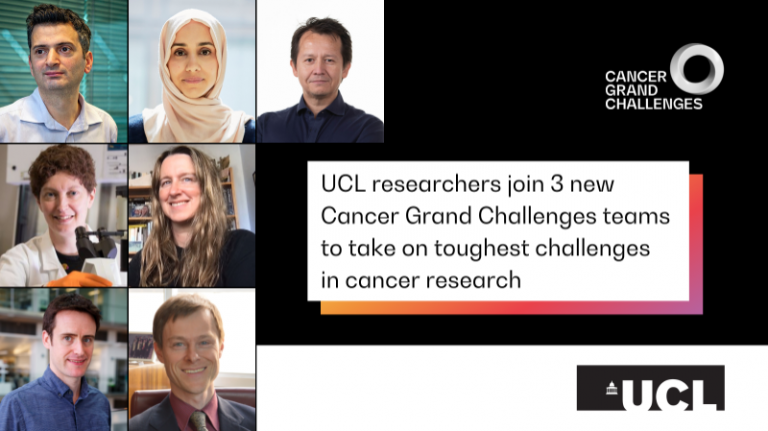UCL researchers receive £12m from Cancer Grand Challenges
16 June 2022
Seven scientists at UCL will take on some of the toughest obstacles in cancer, after being selected to play leading roles in the latest global Cancer Grand Challenges.

Set up by Cancer Research UK and the National Cancer Institute in the US (part of the National Institutes of Health), Cancer Grand Challenges aims to drive progress against major research and treatment hurdles, by setting ‘challenges’ and bringing diverse, international teams together to think differently.
Today (June 16), Cancer Grand Challenges announced four new teams of scientific investigators who will each receive £20m. UCL researchers are represented in three of the four teams and will receive £11.97m in total, over the next five years.
Dr Martin Pule (UCL Cancer Institute) will co-lead the NexTGen team, which takes on the ‘Solid tumours in children’ challenge. He will be joined by UCL co-investigators Professor Karen Page (UCL Mathematics), Dr Karin Straathof (UCL Great Ormond Street Institute of Child Health), Professor Sergio Quezada and Dr Kevin Litchfield (both UCL Cancer Institute) and Professor Marc-Olivier Coppens (UCL Chemical Engineering).
The team, co-led by the US Children’s National Hospital’s Catherine Bollard and with 23 investigators across the UK, US and France, will work to develop next-generation immunotherapies for children with solid cancers. This team will be joined by seven patient advocates, including Sara Wakeling, who is a Research Assistant at UCL Great Ormond Street Institute of Child Health, and has a particular focus on parental and patient involvement within research.
Commenting, Dr Pule, who leads the UCL CAR-T programme, said: “The vision of the Cancer Grand Challenges NexTGen team is that CAR T-cell therapy for solid childhood cancers will be at the front line within a decade, improving outcomes for children with the poorest prognosis and mitigating the toxicities of our current standard of care.
“By bringing together a critical mass of diverse researchers with a focus on bench to bedside and back again, we believe we’ll overcome current challenges and realise this vision.”
Dr Mariam Jamal Hanjani (UCL Cancer Institute) has been selected to join two Cancer Grand Challenges teams.
She will be co-investigator on the eDyNAmiC team, which is led by Stanford University and taking on the ‘extrachromosomal DNA’ challenge. The team based in UK, US and Germany, will investigate extrachromosomal DNA – a major driver of tumour evolution and why some people’s cancer becomes resistant to treatment – seeking to find new ways to treat some of the hardest-to-treat cancer types.
Dr Hanjani will also be co-investigator on the CANCAN team, which is led by Rutgers Cancer Institute of New Jersey, Weill Cornell Medicine and Cold Spring Harbor Laboratory and taking on the ‘cancer cachexia’ challenge.
With researchers across the UK and US, the team will investigate cancer cachexia – a debilitating wasting condition people often experience in the later stages of their cancer that imparts a poor prognosis and quality of life – seeking to develop novel therapies.
“I feel incredibly honoured and privileged to be part of teams focussed on research that has the potential to significantly impact the lives of the patients with cancer, including the patients I care for,” said Dr Hanjani.
“We hope that our combined breadth of experience and understanding will allow us to address our Cancer Grand Challenge with an open mind, collaborative effort, mutual respect and overwhelming enthusiasm to make new discoveries and to pave the way forward for a positive impact on patient care and clinical outcomes.”
Commenting on the awards, Professor Geraint Rees, UCL Vice Provost (Research, Innovation and Global Engagement) said: “This is an exceptional achievement, and I extend my warmest congratulations to all involved. Cancer affects 1 in 2 people in the UK, and UCL is committed to developing new therapies and pioneering ways to improve patient outcomes. This award will make a real difference to the lives of people living with cancer, and demonstrates the value of diverse, cross-disciplinary research.”
The new teams join a growing global community, uniting more than 700 Cancer Grand Challenges researchers and advocates across 10 countries to take on 10 of the toughest challenges in cancer research.
“Cancer is a global issue that needs to be met with global collaboration. This investment in team science encourages diverse thinking to problems that have long hindered research progress,” said David Scott, PhD, Director of Cancer Grand Challenges, Cancer Research UK.
“Cancer Grand Challenges provides the multidisciplinary teams the time, space and funding to foster innovation and a transformative approach. PROMINENT is one of four newly funded teams joining a scientific community addressing unmet clinical needs across cancer research.”
Image
- Top row, Dr Martin Pule, Dr Mariam Jamal Hanjani, Professor Sergio Quezada, middle row, Dr Karin Straathof, Professor Karen Page, bottom row, Dr Kevin Litchfield, Professor Marc-Olivier Coppens. Credit Cancer Grand Challenges
Source
- Adapted from Cancer Grand Challenges announcement
Links
- Cancer Grand Challenges
- Dr Martin Pule’s academic profile
- Dr Mariam Jamal Hanjani’s academic profile
- Professor Sergio Quezada’s academic profile
- Dr Kevin Litchfield’s academic profile
- Professor Karen Page’s academic profile
- Dr Karin Straathof’s academic profile
- Professor Marc-Olivier Coppens’ academic profile
- UCL Cancer Institute
- UCL Mathematics
- UCL Great Ormond Street Institute of Child Health
- UCL Chemical Engineering
Media contact
Henry Killworth
Tel: +44 (0) 7881 833274
E: h.killworth [at] ucl.ac.uk
 Close
Close

